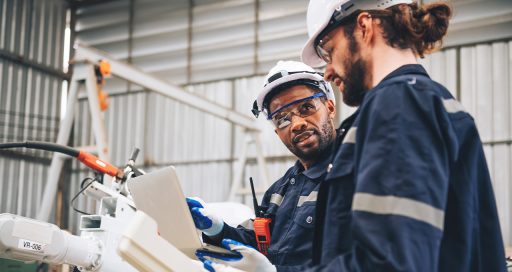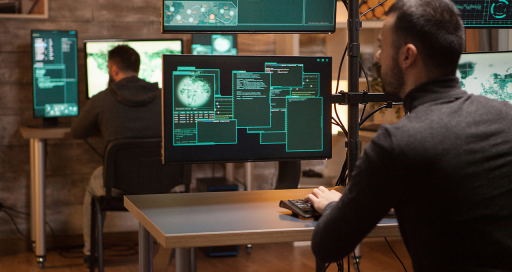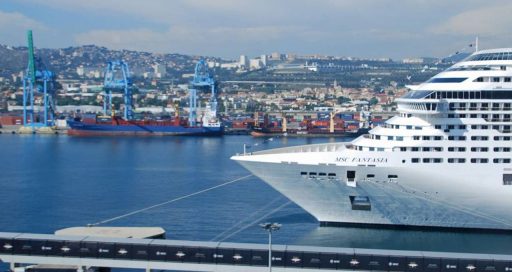AI is the key to transformation in buildings and infrastructure
Reading time: 7 min
It is now five years since the VINCI Group fully embraced the use of algorithms to optimise performance in its solutions, with a carefully thought-out and organised strategy. Read the interview with François Lemaistre, Axians Brand Director and VINCI Group AI Sponsor.

Where societal concerns and decisive political choices coincide, artificial intelligence (AI) increasingly appears to hold the key to business transformation and the future competitiveness of our industry. And this is especially true in the construction and building management sectors.
“Algorithms already feature strongly in production processes, but in the future will play a huge role,” says François Lemaistre, Axians (VINCI Energies) Brand Managing Director and VINCI Group AI Sponsor. “However, let’s not forget that AI, which emerged in the 1950s, is no miracle solution, and that its effectiveness depends on strictly controlled implementation.”
Though AI has had variable results over the past 80 years, three factors fundamental to its success have now aligned: sophisticated algorithms, massive data sets, and prodigious computing power.
But context is not everything. “Manufacturers still need to implement a carefully thought-out and organised approach to using these algorithms,” says François Lemaistre. “That’s what we did at the VINCI Group in 2018, when we created a new forward-looking think tank.”
Rapid industrial application
When the working group presented its findings to the Group’s Executive Committee a few months later, the conclusions were clear: AI is an efficient tool that will transform many things and that offers great potential for VINCI’s businesses. He continues, “We then structured a programme with three major objectives: to raise awareness of AI within the Group, to create communities for pooling the required skills, and to support business unit initiatives and projects.”
After a 12-month test run, eight initial projects were successfully incubated with Leonard, the VINCI group’s future-oriented innovation platform. These projects were all highly operational in nature, with a focus on rapid industrial application, one example being SprinkIA, a new tool for sizing sprinkler networks (water-spray fire protection systems for buildings).
In five years, 70 projects have been incubated at Leonard, with VINCI Energies behind two-thirds of them.
As François Lemaistre explains, “One week of incubation was enough to show it was possible to configure a fire suppression system in just a few minutes, which without algorithms would take several weeks to design. In addition, the SprinkIA project showed that we could incorporate criteria for standardising the pipes used into the calculation process, and thus generate cost savings. For customers, it means a much faster and more reliable service in high-pressure scenarios such as calls for tenders.”
From this first wave of research at Leonard, a structure was created – DIANE (Digital et Intelligence Artificielle pour Nos Entreprises) – with the aim facilitating the application of AI-based use cases in different VINCI Energies business activities. “The virtuous loop is working: incubation leads to use cases, which in turn lead to a structured process for promoting the adoption of artificial intelligence,” says the Axians director.
Asking the right questions
But AI is not suited to every application. Algorithms favour readable elements (plans on paper, images, etc.), clear rules and repeating patterns. AI also requires data, which is not always available. Above all, AI is expensive.
As François Lemaistre explains, “Before charging head-first down this or that path, you have to ask yourself three questions: Is the innovation you are looking for already on the market? Can it solve a problem in one or more of our business activities and be combined with conventional methods? What returns does it offer? Based on this analytical framework, we will select between 10% and 20% of the projects presented to us.”
Other prerequisites, if this process is to be effective, are: its adoption by the teams, analytical capacity, and the updating and continuous improvement of what is and must remain a human-controlled tool.
In five years, 70 projects have been incubated at Leonard, with VINCI Energies behind two-thirds of them, divided equally between its four brands: Omexom, Axians, Building Solutions, and Actemium. “AI offers interesting opportunities for most of the operations our business units are likely to be involved with,” says François Lemaistre. “It can improve process automation, service quality, and commercial profitability. That, plus a clearly quantifiable environmental benefit, which is essential given our greenhouse gas reduction target of 40% by 2030.”
Choices that pay
The use of algorithms has already proved profitable on multiple VINCI Group projects, and the Group has also forged closer bonds with the research community to optimise its approach to different fields of application for AI (see box).
Artificial intelligence is already revolutionising the monitoring of critical assets (dams and water distribution networks) through ultra-detailed analysis of high-definition satellite images. It simplifies maintenance at offshore wind farms. It offers numerous advantages for engineering and building management, helping reduce their construction carbon footprint and long-term energy consumption. AI is also used to support railway track maintenance, assisted design for soil reinforcement, checking design work, preventive detection of underground water leaks, etc.
Cross-business functions can also benefit from AI support. For example, it allows legal teams to apply a reading matrix, capable of analysing very precise details such as late penalties, to every call for tenders.
The investments and choices made in recent years are now bearing fruit. “AI is a powerful instrument for improving the technical, commercial and environmental performance of our solutions, and the fairness of our pricing, in strict compliance with ethical rules and data protection legislation,” concludes François Lemaistre. “We are betting that it won’t destroy jobs but will improve how we apply our skills, again to improve performance.”
Sponsor of Hi! PARIS
To more effectively investigate various fields of application for AI, VINCI has teamed up with the further education and research communities by becoming a sponsor of Hi! PARIS, the centre for interdisciplinary research in AI and Data Science, created by HEC Paris and Institut Polytechnique de Paris (X, ENSTA, ENSAE, Télécom Paris, Télécom SudParis). The aim of this collaboration is to provide researchers with real-world case studies to stimulate their thinking and help them develop projects with industrial and social applications.
04/16/2024




